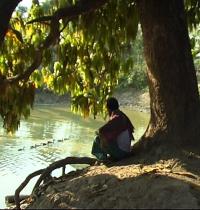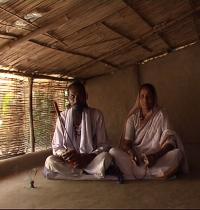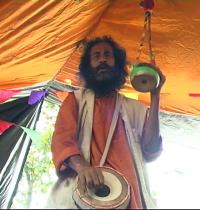Amitabh Chakraborty
Grant Period: Over six months
Most documentary filmmakers go into a context, film what they require and emerge with a final cut that travels the festival circuit. More often than not, they do not engage with their subjects or their context beyond the scope of the film. Amitabh Chakraborty’s dissemination project addresses this lacuna in returning to the context of filming to make a difference. The fakirs have always occupied a marginal space in the social and economic fabric of rural Bengal. Prejudice and lack of proper knowledge has led to a gross misreading of their spiritual and cultural practices, and the primary relationship between the fakirs and the larger community has been one of mistrust. Orthodox Islam has contributed to an already precarious existence by banning the fakirs’ music since it speaks of a secret knowledge outside the scriptural realm. Amitabh seeks to use his film, Bishar Blues, to open a dialogue between the fakirs and the larger community in parts of rural Bengal.
The dissemination plan focuses on two screenings/discussions in rural Bengal and a seminar/screening in Kolkata. Since Murshidabad, Nadia and Birbhum are the three districts where the majority of fakirs live out a fringe existence, the two screenings/ discussions are intended to engage the larger community in these districts. Amitabh will collaborate with the Baul Fakir Sangh, an organisation set up by Shaktinath Jha, a professor of Bengali in Behrampur College, and a leading scholar on the fakirs. The Sangh intervenes and mediates on their behalf when their rights as individuals are challenged or threatened. While the screening of the film would provide a context for a community gathering, Dr Jha would be instrumental in raising and debating issues. The dissemination will begin with a screening/discussion in Pradip Danga, a village in Murshidabad. Amitabh is keen to have people from Murshidabad and Nadia gather for the screening. Other than Dr Jha, Nazrul Fakir and Liaquat Ali, who feature in Amitabh’s film, will moderate the discussion. The next screening will be held in Alam Baba’s mazhar, in Dubrajpur, Birbhum district. The mazhar has become a site for pilgrimage and people from all over the state flock to it at specific times of the year. The mazhar features prominently in Bishar Blues. Both screenings/discussions will be documented on video to serve as archival material and as bonus features for the DVD of Bishar Blues.
The Kolkata event will focus on an exchange between the fakirs and an urban audience. Amitabh intends to invite a number of scholars and activists with an interest in marginal cultures in West Bengal and the larger question of secularism. The chief aim of this project is to demystify, elucidate and unpack the life and music of the fakirs for both Hindus and orthodox Muslims. The primary task at hand is to get the community to interact with the fakirs without treating them as freaks. Amitabh feels that the screenings will be momentous in enabling the fakirs, with the help of Shaktinath Jha, to reflect on what has so far been a ‘secret’ practice for the first time in public. Surojit Sen, Amitabh's research associate for the film, has also been awarded an IFA grant to work towards a sound archive on the fakirs’ music, an oral history archive and an ethnomusicological travelogue in Bengali on the fakirs and the musical fabric of the region. This dissemination grant to Amitabh Chakraborty, therefore, needs to be seen in conjunction with our grants to Surojit Sen and Moushumi Bhowmik (to disseminate biraha songs of the region).




